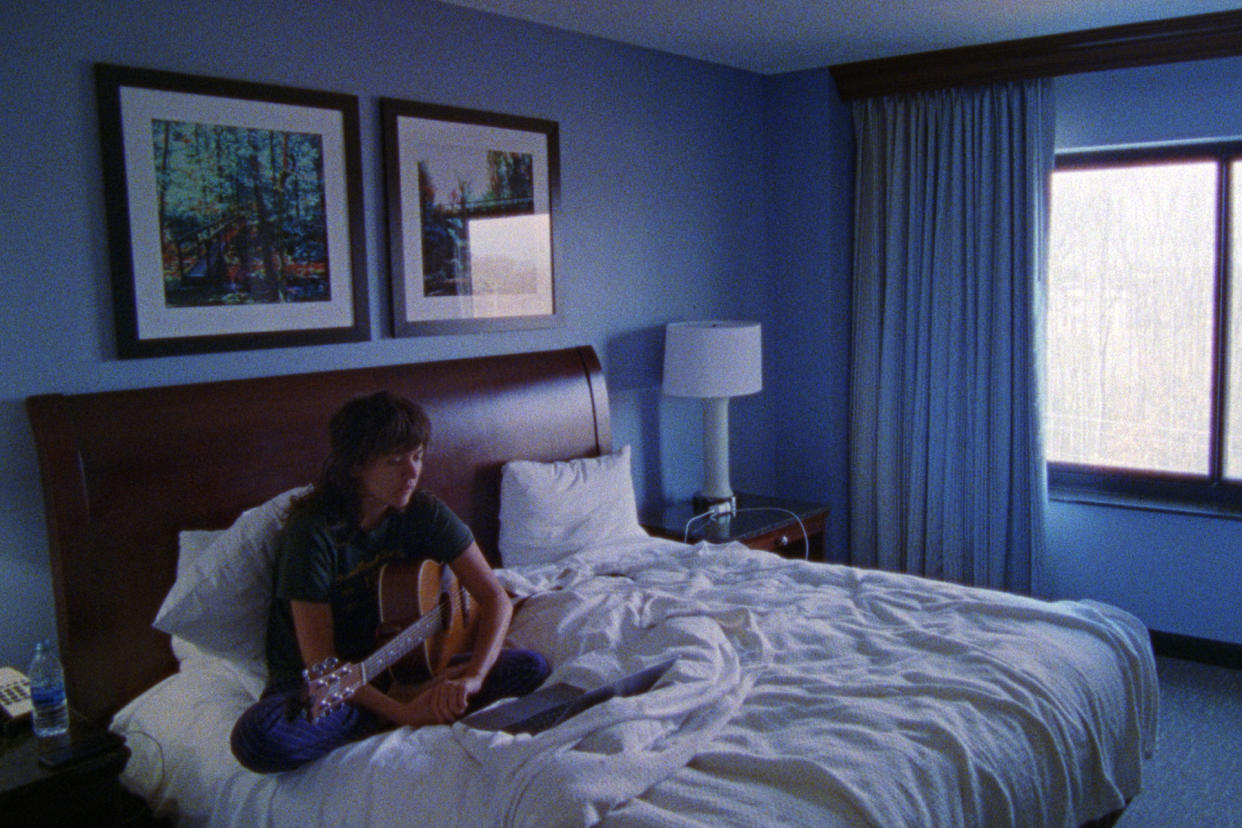‘Anonymous Club’ Gives You the Unfiltered Agony and Ecstasy of Courtney Barnett

“Notoriously shy” is one of the first phrases used to describe Courtney Barnett in Anonymous Club, Danny Cohen’s documentary-cum-tour-diary, and if you only knew this Australian singer-songwriter from her live shows, the words might come as a low-voltage shock. Sensitive, sure. But shy? Onstage, Barnett has a knack for demonstrating why rock is also a verb; a sturdy guitarist on record, she doesn’t appear to play her Fender Telecaster so much as wrestle it into submission. The sound of her music is pure indie-label bliss, filled with confessional lyrics and off-kilter observations and melancholy-Sunday-afternoon vibes buffeted by buzzsaw-sonic melodies. Under a spotlight, everything about her performances feels livewire and dynamic. There is a whole lotta shaking going on.
If you’ve read interviews with Barnett, however, or heard her talk about her work in a more intimate setting than, say, a packed concert hall, you know she’s dealt with her share of social anxiety, panic attacks, self-consciousness. There’s a reclusive nature embedded in her DNA. And when you’re being hailed as the Next Big Thing, the pressure of living up to that hype just so you can get that 90 minutes of freedom in front of a crowd can make you want to shut down. So in 2018, coming off the release of her brilliant sophomore album Tell Me How You Really Feel and going into a world tour to support it, her friend Cohen asked Barnett to keep an audio journal. Part of his request seemed calculated to give her an outlet during the dead hours between bus-bunk sleep and hotel check-ins, sound check and dimming the house lights. And part of it seemed to be an excuse to force Barnett to get out of her head occasionally, and not fully succumb to the demons nagging at the back of her brain.
More from Rolling Stone
Courtney Barnett Heads 'Here and There' on Touring Fest Featuring Sleater-Kinney, Japanese Breakfast
It’s that second speculative part that comes through the strongest when you watch Anonymous Club, which manages to balance the free-form, built-to-spill-it-all-out messiness of a real diary (which Barnett kept recording, off and on, for three years) with the beats of a music documentary. There’s a subset of the genre that puts the grind of life on tour either passively or aggressively on blast — let’s call it the Meeting People Is Easy School of Rockumentaries. Hotel rooms in Tokyo, Tampa, and Toronto become interchangeable. Fans are lovely, though they occasionally ask you to write the lyrics of your songs — and not just one or two lines — on the back of their t-shirt. The media? They’re fucking idiots. (Dear The Media: You are doing none of us any good by asking “How is it for you having your work associated with such difficult, unpleasant, painful things?” or, per one extremely enthusiastic German TV presenter, “You say you don’t want to be someone’s ‘bitch’…who are you mad at?!”) The boredom, the post-show comedown, the endless nights away from home, the sense of dislocation that can make you wonder why you’re doing this, and is this all you’re good for?
That’s all here, albeit in a form that treats a lot of these things as part of the agony and ecstasy of being Courtney Barnett, as she goes from bedroom-recording cult-rocker status to an honest-to-god breakout star. (The one big complaint here is that you get a good deal of Barnett onstage, thrashing and thumping in front of thousands while moody instrumentals play on the soundtrack, but not nearly enough actual live performance footage. The brief sequences of her crooning Hank Williams’ “I’m So Lonesome I Could Cry” and leading a sing-along of “Sunday Roast” are a bit of a tease.) But around the halfway point of this brief doc, she begins to open up to the microphone, talking about the sense of alienation she feels even when adoration pours in, how she doesn’t feel like she can hack it, how it’s all just so dark even on her brightest days.
And this is where Anonymous Club becomes something more than just a cool document of a cool singer made for cool fans. All of whom, of course, will coolly dig it. It’s also a portrait of depression, the kind that can cripple creative types, and there are moments when you genuinely worry about Barnett even though you know what’s around the bend. We do get to watch her work her way through songs, battle writer’s block to a draw, and with the help of her friend Stella Mozgawa from Warpaint, start to get her mojo back in between making them both toast. Yet it’s the bits of listening and seeing her open up about her struggle with stuff outside of the songwriting that becomes compelling here, and in a way that goes the beyond the music. It’s a perfectly good rockumentary. It may be an even better group therapy session, led by one person’s unfiltered experience down in a hole yet resonating as deeply for anyone else still struggling to lift themselves up. Welcome to the club.
Best of Rolling Stone


